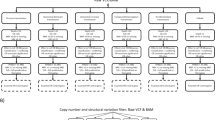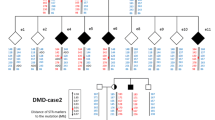Abstract
Purpose
Preimplantation genetic testing for monogenic disorders (PGT-M) allows early diagnosis in embryos conceived in vitro. PGT-M helps to prevent known genetic disorders in affected families and ensures that pathogenic variants in the male or female partner are not passed on to offspring. The trend in genetic testing of embryos is to provide a comprehensive platform that enables robust and reliable testing for the causal pathogenic variant(s), as well as chromosomal abnormalities that commonly occur in embryos. In this study, we describe PGT protocol that allows direct mutation testing, haplotyping, and aneuploidy screening.
Methods
Described PGT protocol called OneGene PGT allows direct mutation testing, haplotyping, and aneuploidy screening using next-generation sequencing (NGS). Whole genome amplification product is combined with multiplex PCR used for SNP enrichment. Dedicated bioinformatic tool enables mapping, genotype calling, and haplotyping of informative SNP markers. A commercial software was used for aneuploidy calling.
Results
OneGenePGT has been implemented for seven of the most common monogenic disorders, representing approximately 30% of all PGT-M indications at our IVF centre. The technique has been thoroughly validated, focusing on direct pathogenic variant testing, haplotype identification, and chromosome abnormality detection. Validation results show full concordance with Sanger sequencing and karyomapping, which were used as reference methods.
Conclusion
OneGene PGT is a comprehensive, robust, and cost-effective method that can be established for any gene of interest. The technique is particularly suitable for common monogenic diseases, which can be performed based on a universal laboratory protocol without the need for set-up or pre-testing.


Similar content being viewed by others
Abbreviations
- ADO :
-
Allele drop-out
- CNV :
-
Copy number analysis
- MDA :
-
Multiple displacement amplification
- PGT-M :
-
Preimplanation genetic testing for monogenic diseases
- STR :
-
Short tandem repeat
- SNP :
-
Single nucleotide polymorphism
- WGA :
-
Whole genome amplification
- MPS :
-
Massively parallel sequencing
- NGS :
-
Next-generation sequencing
- IVF :
-
in vitro Fertilisation
References
Lee I, Alur-Gupta S, Gallop R, Dokras A. Utilization of preimplantation genetic testing for monogenic disorders. Fertil Steril. 2020;114(4):854–60.
van Montfoort A, Carvalho F, Coonen E, Kokkali G, Moutou C, et al. ESHRE PGT Consortium data collection XIX–XX: PGT analyses from 2016 to 2017†. Hum Reprod Open. 2021;3:hoab024.
Forman EJ, Ferry KM, Gueye N-A, Smith RD, Stevens J, Scott RT. Trophectoderm biopsy for single-gene disorder preimplantation genetic diagnosis (PGD) is significantly more reliable than day 3 blastomere biopsy. Fertil Steril. 2011;96(3):S222.
Fiorentino F, Biricik A, Nuccitelli A, De Palma R, Kahraman S, et al. Rapid protocol for pre-conception genetic diagnosis of single gene mutations by first polar body analysis: a possible solution for the Italian patients. Prenat Diagn. 2008;28(1):62–4.
Tuffs A. Germany allows restricted access to preimplantation genetic testing. BMJ. 2011;343:d4425.
Gutiérrez-Mateo C, Sánchez-García JF, Fischer J, Tormasi S, Cohen J, et al. Preimplantation genetic diagnosis of single-gene disorders: experience with more than 200 cycles conducted by a reference laboratory in the United States. Fertil Steril. 2009;92(5):1544–56.
Handyside AH, Harton GL, Mariani B, Thornhill AR, Affara N, et al. Karyomapping: a universal method for genome wide analysis of genetic disease based on mapping crossovers between parental haplotypes. J Med Genet. 2010;47(10):651–8.
Natesan SA, Bladon AJ, Coskun S, Qubbaj W, Prates R, et al. Genome-wide karyomapping accurately identifies the inheritance of single-gene defects in human preimplantation embryos in vitro. Genet Med. 2014;16(11):838–45.
Renwick P, Gonzalez J, Hewitson H. Evaluation and implementation of onepgt for monogenic conditions. Reprod Biomed Online. 2019;39:e26-27.
De Witte L, Raman L, Baetens M, De Koker A, Callewaert N, et al. GENType: all-in-one preimplantation genetic testing by pedigree haplotyping and copy number profiling suitable for third-party reproduction. Hum Reprod. 2022;37(7):1678–91.
Masset H, Ding J, Dimitriadou E, Ardeshirdavani A, Debrock S, et al. Single-cell genome-wide concurrent haplotyping and copy-number profiling through genotyping-by-sequencing. Nucleic Acids Res. 2022;50(11):e63.
Xie P, Hu X, Kong L, Mao Y, Cheng D, et al. A novel multifunctional haplotyping-based preimplantation genetic testing for different genetic conditions. Hum Reprod. 2022;37(11):2546–59.
Hassold T, Hunt P. To err (meiotically) is human: the genesis of human aneuploidy. Nat Rev Genet. 2001;2(4):280–91.
Schoolcraft WB, Treff NR, Stevens JM, Ferry K, Katz-Jaffe M, Scott RT. Live birth outcome with trophectoderm biopsy, blastocyst vitrification, and single-nucleotide polymorphism microarray–based comprehensive chromosome screening in infertile patients. Fertil Steril. 2011;96(3):638–40.
Li H. Aligning sequence reads, clone sequences and assembly contigs with BWA-MEM. arXiv, 2013; https://doi.org/10.48550/arXiv.1303.3997.
Lai Z, Markovets A, Ahdesmaki M, Chapman B, Hofmann O, et al. VarDict: a novel and versatile variant caller for next-generation sequencing in cancer research. Nucleic Acids Res. 2016;44(11):e108.
ESHRE PGT-M Working Group, Carvalho F, Moutou C, Dimitriadou E, Dreesen J, et al. ESHRE PGT Consortium good practice recommendations for the detection of monogenic disorders†. Hum Reprod Open. 2020;2020(3):hoaa018.
Coonen E, van Montfoort A, Carvalho F, Kokkali G, Moutou C, et al. ESHRE PGT Consortium data collection XVI–XVIII: cycles from 2013 to 2015†. Hum Reprod Open. 2020;2020(4):hoaa043.
Lazarin GA, Haque IS. Expanded carrier screening: a review of early implementation and literature. Semin Perinatol. 2016;40(1):29–34.
Capalbo A, Valero RA, Jimenez-Almazan J, Pardo PM, Fabiani M, et al. Optimizing clinical exome design and parallel gene-testing for recessive genetic conditions in preconception carrier screening: translational research genomic data from 14,125 exomes. PLoS Genet. 2019;15(10):e1008409.
Biezuner T, Raz O, Amir S, Milo L, Adar R, et al. Comparison of seven single cell whole genome amplification commercial kits using targeted sequencing. Sci Rep. 2021;11(1):17171.
Huang L, Ma F, Chapman A, Lu S, Xie XS. Single-cell whole-genome amplification and sequencing: methodology and applications. Annu Rev Genomics Hum Genet. 2016;16(1):79–102.
de Bourcy CFA, De Vlaminck I, Kanbar JN, Wang J, Gawad C, Quake SR. A quantitative comparison of single-cell whole genome amplification methods. PLoS ONE. 2014;9(8):e105585.
Chen CK, Yu HT, Soong YK, Lee CL. New perspectives on preimplantation genetic diagnosis and preimplantation genetic screening. Taiwan J Obstet Gynecol. 2014;53(2):146–50.
Volozonoka L, Perminov D, Korņejeva L, Alkšere B, Novikova N, et al. Performance comparison of two whole genome amplification techniques in frame of multifactor preimplantation genetic testing. J Assist Reprod Genet. 2018;35(8):1457–72.
Unsal E, Aktuna S, Aydin M, Ozer L, Baltacı V. Improved IVF success of combined PGT-M and PGT-A applications. Reprod Biomed Online. 2019;39:e69-70.
Magli MC, Gianaroli L, Ferraretti AP, Lappi M, Ruberti A, Farfalli V. Embryo morphology and development are dependent on the chromosomal complement. Fertil Steril. 2007;87(3):534–41.
Chen S, Yin X, Zhang S, Xia J, Liu P, et al. Comprehensive preimplantation genetic testing by massively parallel sequencing. Hum Reprod. 2021;36(1):236–47.
Kemper JM, Vollenhoven BJ, Talmor AJ. Preimplantation genetic testing for aneuploidy: a review. Obstet Gynecol Surv. 2019;74(12):727–37.
Franasiak JM, Forman EJ, Hong KH, Werner MD, Upham KM, et al. Aneuploidy across individual chromosomes at the embryonic level in trophectoderm biopsies: changes with patient age and chromosome structure. J Assist Reprod Genet. 2014;31(11):1501–9.
Schaeffer E, Porchia L, López-Luna A, Hernández-Melchor D, López-Bayghen E. Aneuploidy rates inversely correlate with implantation during in vitro fertilization procedures: In Favor of PGT. Mod Med Genet Genomics. 2018; IntechOpen: London, UK, 2018; pp. 1–19
Jia CW, Wang L, Lan YL, Song R, Zhou LY, et al. Aneuploidy in early miscarriage and its related factors. Chin Med J (Engl). 2015;128(20):2772–6.
Yang Z, Liu J, Collins GS, Salem SA, Liu X, et al. Selection of single blastocysts for fresh transfer via standard morphology assessment alone and with array CGH for good prognosis IVF patients: results from a randomized pilot study. Mol Cytogenet. 2012;5(1):24.
Scott RT, Ferry K, Su J, Tao X, Scott K, Treff NR. Comprehensive chromosome screening is highly predictive of the reproductive potential of human embryos: a prospective, blinded, nonselection study. Fertil Steril. 2012;97(4):870–5.
Harton GL, Munné S, Surrey M, Grifo J, Kaplan B, et al. Diminished effect of maternal age on implantation after preimplantation genetic diagnosis with array comparative genomic hybridization. Fertil Steril. 2013;100(6):1695–703.
Haddad G, Deng M, Wang CT, Witz C, Williams D, et al. Assessment of aneuploidy formation in human blastocysts resulting from donated eggs and the necessity of the embryos for aneuploidy screening. J Assist Reprod Genet. 2015;32(6):999–1006.
Sills ES, Li X, Frederick JL, Khoury CD, Potter DA. Determining parental origin of embryo aneuploidy: analysis of genetic error observed in 305 embryos derived from anonymous donor oocyte IVF cycles. Mol Cytogenet. 2014;7:68.
Popovic M, Dhaenens L, Boel A, Menten B, Heindryckx B. Chromosomal mosaicism in human blastocysts: the ultimate diagnostic dilemma. Hum Reprod Update. 2020;26(3):313–34.
Viotti M, Victor AR, Barnes FL, Zouves CG, Besser AG, et al. Using outcome data from one thousand mosaic embryo transfers to formulate an embryo ranking system for clinical use. Fertil Steril. 2021;115(5):1212–24.
Author information
Authors and Affiliations
Contributions
Manuscript drafting: MH; manuscript editing: DK, KB, RN, VH; developing OneGene PGT method: MH, KB; participating in experiments, sample preparation and data collection: MH, KB, DK, RN, VH, MBa, MBo, KW; final approval of the manuscript: KV. All authors have critically reviewed the manuscript and have approved the final version submitted for publication.
Corresponding author
Ethics declarations
Ethics approval
The study was approved by the Reproductive Medicine Ethics Committee of the Repromeda IVF centre. All DNA samples used for the method validation were collected with informed consent, allowing the laboratory to use them anonymously for research purposes.
Conflict of interest
The authors declare no competing interests.
Additional information
Publisher's Note
Springer Nature remains neutral with regard to jurisdictional claims in published maps and institutional affiliations.
Supplementary Information
Below is the link to the electronic supplementary material.
10815_2023_2998_MOESM1_ESM.xlsx
Supplementary file1 (XLSX 37 KB) Supplement A. List of SNP markers used for OneGene PGT analysis. List includes rs numbers, coordinates and population allele frequency (non-Finnish Europeans from gnomAD database).
10815_2023_2998_MOESM2_ESM.xlsx
Supplementary file2 (XLSX 21 KB) Supplement B. Validation study. Results showing concordance between OneGene PGT and reference method (Sanger sequencing, karyomapping)
10815_2023_2998_MOESM3_ESM.png
Supplementary file3 (PNG 225 KB) Supplement C. Example of OneGene PGT analysis report. The example of direct mutation testing and linkage analysis results using OneGene PGT software. Informative SNP markers are shown in red/blue colour indicating paternal haplotype I or II; similarly, in yellow/green colour indicating maternal haplotype I or II.
Rights and permissions
Springer Nature or its licensor (e.g. a society or other partner) holds exclusive rights to this article under a publishing agreement with the author(s) or other rightsholder(s); author self-archiving of the accepted manuscript version of this article is solely governed by the terms of such publishing agreement and applicable law.
About this article
Cite this article
Hornak, M., Bezdekova, K., Kubicek, D. et al. OneGene PGT: comprehensive preimplantation genetic testing method utilizing next-generation sequencing. J Assist Reprod Genet 41, 185–192 (2024). https://doi.org/10.1007/s10815-023-02998-3
Received:
Accepted:
Published:
Issue Date:
DOI: https://doi.org/10.1007/s10815-023-02998-3




